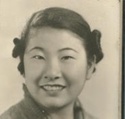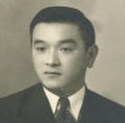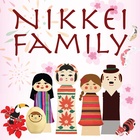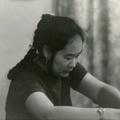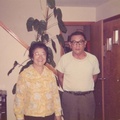In my family we told stories; we reminisced. During and after meals. Sitting in the living room all together for no particular reason. Because we were all so tightly bound together there was no need for a beginning, middle, and end. One of us would utter a single sentence, a phrase. That was enough. It was a cue. “Oh, I remember.” We would smile and nod, and like a chorus replay together the memory. The stories were always about one of us or all of us. Sometimes there was a lesson. Sometimes a character flaw revealed. But the endings were never grim. We always laughed. Lighthearted.
On rare occasions my mother would reminisce about my parents’ life in California and Rohwer before my sisters and I were born. She told only bits and pieces, gave only a glimpse. I don’t know why I never asked her, never probed for details. Something made me stay silent and still as if I were spying or eavesdropping. Sometimes I think these memories surrounded my family like air, and I must know them by osmosis. So maybe all the details of this story are true, and I’ve just cobbled them together. Or maybe most I invented, imagined. I don’t really know.
“A ham. A whole ham.”
My parents are on a bus or a train. I don’t know why they are there, or where they are going. For some reason I believe their trip is not a happy one. There is something deadening and bleak about this ride, and I don’t know why I believe this. I picture my parents sitting near the back, scrunched together, sweaty and hot. My mother is cradling something in her lap, a small bag, their lunch. My father stares ahead blankly. My mother, as she has always done, ignores context and dire situations and focuses with childlike curiosity on the innocent details of her surroundings. She notices the slight tear in a seat cushion, the loose seam in another passenger’s sleeve. And sitting in the back of that bus or train she happens to see a package tucked, almost hidden, beneath an empty seat up front. She can tell it’s something large, irregularly shaped, wrapped in brown paper, and together with my father they begin to speculate about what it could be. This is the part of the story my mother lingers over, provides the most details.
“We didn’t think it could be a jacket or any kind of clothes because of the way it was shaped,” she says. “I thought it was at first, but Daddy said, ‘No, no. Look at it.’” My mother smiles at this point in the story. “A ham.” She closes her eyes, chuckles. “We were convinced.” They spend the rest of their ride whispering, planning what was the best way to claim the forgotten package. “Wait until we’re getting off,” my father says. “I’ll pick it up as we leave.” “What if someone sees us?” “Don’t look at it now. Pretend it’s not there.” “Oh,” my mother says, “we were so worried someone else would take it.” She leans forward, her eyes bright, “We were so excited.” I smile, too, and imagine them trying to remain outwardly calm while rehearsing their clumsy subterfuge. But their plan works, and I picture them walking slowly, stiff backed, mimicking what they think is nonchalance. “A treasure,” my mother draws in a breath. “A whole ham.”
But my father knew almost immediately. “From the weight he could tell and the feel of it, but he didn’t want to say right away. I was so disappointed. I could already taste it.” It wasn’t a ham. It was some kind of large gourd. My mother shakes her head, smiles. “And in our hurry to get it, in all that planning and whispering, we left behind our own lunch.”
I used to think this memory of my mother’s was like some kind of O’Henry tale. Gentle and sweet. But it occurs to me that it says something about my parents, about my family. When I was younger I often wondered why they chose, after internment, to move to the unknown Chicago instead of returning to California. And once in Chicago, I wondered with some selfish anger why they chose to leave a community and move to a suburb where we were guaranteed to be the only Asians. But now I believe my mother’s reminiscence reveals another family tradition. My parents saw the future like they saw that package. All through their lives, despite everything, they had hope, and they allowed themselves to believe in a promise; I can’t help thinking there is something brave in that. My parents would not be afraid to take a chance even when in their rush to reach, some things would be left behind.
© 2015 Barbara Nishimoto


